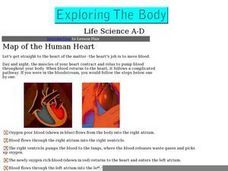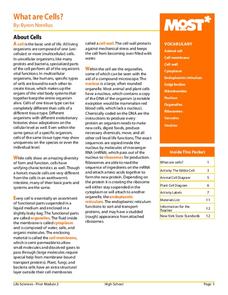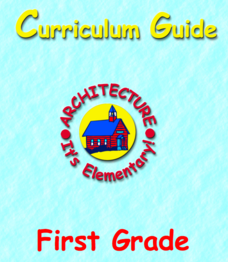Curated OER
Levers and Wedges in the Human Body
Students identify the various parts of the body that serve as wedges and levers, identifying the fulcrum for each body lever. They bite into carrots and apples to analyze how their jaws and teeth work, then complete three worksheets that...
Curated OER
Understanding the Body, Day 1: Anatomy
Intended for moderate to severely disabled students, this lesson plan focuses on building an understanding of human anatomy. A secondary special education class reviews, identifies, and labels parts of the body. Including the internal...
Curated OER
Levers and Wedges in the Human Body
Young biologists identify parts of the body that serve as wedges (teeth and fingernails), and as levers (jaw, arms, and legs). The hands-on activities described here should be exciting for learners to perform, and should also lead to a...
Curated OER
The Body and the Five Senses
Read De la cabeza a los pies once for your learners before teaching them the body movements that accompany the book. Then, read it again and have the learners demonstrate the movements! There's also a chart to help...
Curated OER
Map of the Human Heart
Click on this link and find two animated graphics of the pumping human heart. The path of blood-flow is listed in steps. The connection to the "teacher lesson plan information" does not work, but there are other links to superb resources...
Alabama Learning Exchange
Heads, Shoulders, Knees, and Toes
The identification of various parts of the human body is the focus of this biology lesson. Young scientists sing the song "Head, Shoulders, Knees, and Toes," and trace the human body onto butcher paper. Additionally, they label the parts...
Baylor College
Pre-Assessment: The Brain
Break your class in to the general structure and function of the brain. Brainiacs discuss what they know about it and create personalized brain development timelines. They also take a true-false, pre-assessment quiz to get them thinking...
Baylor College
Why Circulate?
Lub-dub, lub-dub. Why does the heart beat? Why does blood circulate throughout the body? Life scientists find out how important circulation is for dissolving and dispersing materials by timing how long it takes for food coloring spread...
Nemours KidsHealth
Human Body Series - The Five Senses
Get your class up and moving with these engaging hands-on-activities that target their five senses. Children explore four different work stations that require them to look, smell, hear, touch, and taste as they record their responses...
BBC
Ourselves
Young biologists identify parts of the body, sort humans from other animals, and list the difference they see. Learners are split up into groups of three, and each group must find pictures in magazines of humans and other animals. They...
Curated OER
Fun Bones
Use the hokey pokey music to teach the names of some of the major bones in the human body. Circle up, put on the music, and put your right radius in. Use this in an anatomy class to spice things up a bit!
Baylor College
What Is a Neuron?
Your class won't get on your nerves while doing this modeling activity! After teaching the structure and function of a neuron using the included diagrams, give individuals some clay and chenille stems so that they can make their own...
Howard Hughes Medical Institute
Understanding Variation
Does where we live influence how our bodies express genetic traits? Explore variation in human skin color with an activity that incorporate video and hands-on learning. Individuals model the relationship between phenotypes and genotypes,...
Curated OER
Introduction to Nutrition
Fourth graders take a closer look at the foods they eat and the nutritional value of each. This activity helps them see why foods are grouped together the way they are and what types of nutrition are provided by these food groups. They...
Curated OER
Explore Fish
Read Animals Called Fish with your young Spanish language learners and talk about the different parts of a fish. After teaching terms like huesos, columna vertebral, aletas, escamas, etc, Learners...
Howard Hughes Medical Institute
Viral DNA Integration
How do reverse transcriptase inhibitors work? Young virologists examine the function of azidothymidine, a drug doctors use to treat HIV patients, during a hands-on modeling activity. Groups create a strand of DNA from an HIV RNA strand...
Curated OER
Skin and Sports
The topic is protecting our own protective covering: the skin. In particular, the information deals with sweating as a means of temperature regulation and the need to wear clothing appropriate for allowing the process to occur. Learners...
Curated OER
What Are Cells?
Energize the cells of young biologists with an edible life science activity. Engaging students in exploring the inner workings of plant and animal cells, this activity involves using colored jello and various sweet and...
Curated OER
Hazards: Second Grade Lesson Plans and Activities
Equip learners with safety knowledge in the case of an earthquake. After coloring the places to go to get help after a quake, and label places that wouldn't be safe to go after a quake, young geologists simulate three levels of...
American Institute of Architects
Architecture: It's Elementary!—First Grade
Build an interest and appreciation for architecture in your young learners with this fun 10-lesson art unit. Engaging children in using their five senses, the class first observes the environment around them, paying...
Shmoop
ELA.CCSS.ELA-Literacy.RL.9-10.9
As the saying goes: there are no new stories. Standard 9 for reading literature in the Common Core addresses this fact and requires that young scholars be able to analyze how authors use the themes, stories, and characters of earlier...
Curated OER
Examining and Discussing the Mechanics of Horse Evaluation
Via teacher-led discussion, agriculture classes discover the desirable characteristics of horse anatomy. The PowerPoint and worksheet mentioned in this plan are not available; however you may find the notes useful as a guide to the...
Other popular searches
- Human Body Parts Pictures
- Spanish Human Body Parts
- Human Body Parts Edible
- Human Body Parts Bingo
- Main Human Body Parts
- The Human Body Parts
- Human Body Parts Photographs
- Human Body Parts Worksheet
- Pics Human Body Parts
- Human Body Parts Names
- Human Body Parts Poster
- Parts of the Human Body























